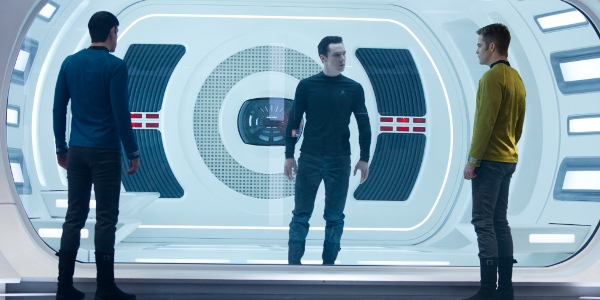Penguins of Madagascar (2014)
December 7, 2014 Leave a comment
 Sick of the sound of “I Like To Move It”, Skipper (Tom McGrath), Kowalski (Chris Miller), Rico (Conrad Vernon) and Private (Christopher Knights) load up the circus’ canon and launch themselves far out of earshot. At Fort Knox, where the penguins hope to celebrate Private’s birthday with a few packets of Cheesey Dibbles, a discontinued product banned everywhere else for its unhealthy ingredients, they are kidnapped by Dave (John Malkovich), an octopus from their days at Central Park Zoo who holds penguin-kind responsible for repeatedly stealing his thunder by drawing attention away from his own enclosure. They are rescued in Venice by North Wind, an elite inter-species task-force lead by [Classified] (Benedict Cumberbatch) who have learnt of Dave’s plans: to use a special “Medusa” serum to harvest the penguins’ cuteness. Unwilling to work together, however, the two teams soon find themselves competing for the upper hand, paw or flipper.
Sick of the sound of “I Like To Move It”, Skipper (Tom McGrath), Kowalski (Chris Miller), Rico (Conrad Vernon) and Private (Christopher Knights) load up the circus’ canon and launch themselves far out of earshot. At Fort Knox, where the penguins hope to celebrate Private’s birthday with a few packets of Cheesey Dibbles, a discontinued product banned everywhere else for its unhealthy ingredients, they are kidnapped by Dave (John Malkovich), an octopus from their days at Central Park Zoo who holds penguin-kind responsible for repeatedly stealing his thunder by drawing attention away from his own enclosure. They are rescued in Venice by North Wind, an elite inter-species task-force lead by [Classified] (Benedict Cumberbatch) who have learnt of Dave’s plans: to use a special “Medusa” serum to harvest the penguins’ cuteness. Unwilling to work together, however, the two teams soon find themselves competing for the upper hand, paw or flipper.
It is often said that Skipper, Kowalski, Rico and Private are the best thing about DreamWorks Animation’s Madagascar franchise, and while that might do the rest of the ensemble something of a disservice it is certainly true that their surreal shenanigans are always a pleasure to watch — whether executing Operation Tourist Trap in Africa with little more than an egg or escaping Captain Chantel Dubois and the rest of Monaco’s pest control department aboard a monkey-powered plane. Anyone who’s seen their Nickelodeon television series knows that they are quite capable of going it alone (albeit with the occasional helping hand), and with DreamWorks Animation bringing the film’s release forward to bolster a disappointing 2014 and better compete with Paddington and Night at the Museum: Secret of the Tomb they are undoubtedly banking on the brand’s enduring popularity.
The good news is that the penguins are as entertaining as ever — McGrath, Miller, Vernon and Knights (reinstated after having been recast for the television series) getting at least as many laughs as starry new additions Benedict Cumberbatch — who, bizarrely, can’t seem to pronounce the word penguins — and John Malkovich. McGrath in particular is a gifted voice artist, up there with the esteemed likes of John Ratzenberger and Patrick Warburton. From their anarchic Antarctic introduction through to their Stateside showdown with Dave the penguins maintain a gag-rate and consistency that is almost unknown in the comedy genre. The series is known for slapstick and surrealism but Penguins of Madagascar once again shows that DreamWorks can do satire as well as anyone, as Werner Herzog proves in his cameo as a documentary filmmaker. Malkovich, meanwhile, steals the show as Dave, who, like the studio’s own Megamind, is almost completely useless as a villain — failing at first impressions as he establishes a sound-free video link with North Wind. He also has the funniest running gag, giving his minions orders that make them sound like famous actors: “John, hurt them”, “Kevin, bake on, we’re still going to need that victory cake” — that sort of thing.
As much fun as the film is, however, it’s even flimsier than usual. The Madagascar franchise was fuelled — however superfluously — by the animals’ desire to get back home, and despite its geographical diversions and narrative detours it at least felt as though the characters were progressing from one farce to the next. There is almost no shape to Penguins of Madagascar, and even while you’re laughing it’s hard not to question if there was any real need for a spin-off beyond an attempt to balance the books. Set-pieces in Venice and Shanghai (initially mistaken for Dublin, Ireland) continue to escalate but without ever seeming to achieve anything, while ultimately North Wind serve no purpose whatsoever. The finale, meanwhile, is absurd even by the series’ standards, and keeps contradicting itself. The film justified its trip to Fort Knox by establishing that it was the only place left on Earth where the penguins could get Cheesey Dibbles, only for them to be readily available in a random New York mini-mart when they’re required to stop Dave. It’s not until an admittedly inspired mid-credits scene that the status-quo is finally re-established and the plot resolved in time for 2018’s Madagascar 4.
There is no denying that Penguins of Madagascar is one of the funniest films of the year — at least on a par with ‘proper’ comedies like 22 Jump Street and What We Do In The Shadows — only it manages to reduce you to tears of laughter while also being sweet-natured and suitable for the entire family.













